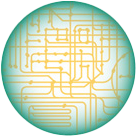The Fungal Microbiome: Discovering and Investigating Novel Endohyphal Inhabitants
Authors:
Patrick Chain1* ([email protected]), Julia Kelliher1, Reid Longley1, Aaron Robinson1, Buck Hanson1, Demosthenes Morales1, Leah Johnson1, La Verne Gallegos-Graves1, Justine Macalindong1, Kelli Feeser1, James Brunner1, Mary Lipton2, Guillaume Cailleau3, Saskia Bindschedler3, Pilar Junier3, Scott Baker2, Gregory Bonito4
Institutions:
1Los Alamos National Laboratory; 2Pacific Northwest National Laboratory; 3University of Neuchâtel; 4Michigan State University
URLs:
Goals
The Bacterial-Fungal Interactions (BFI) Science Focus Area (SFA) is focused on elucidating the mechanisms and implications of BFI on larger ecosystem functioning. Part of this work includes characterizing the interactions that occur within and immediately surrounding fungal hyphae (the fungal microbiome) between these fungal hosts, bacterial partners, and several other microorganisms.
Abstract
Fungi are important members of larger, diverse microbiomes such as those in human guts, plant rhizospheres, or soil microbiomes. However, it has been demonstrated that fungi themselves can harbor complex microbiomes both within and directly surrounding the outer surface of their hyphae (Robinson et al. 2021). Endobacterial associates have been observed in both higher and basal lineages of fungi, but major questions remain regarding how these bacterial symbionts are acquired, how they persist within a fungal host, and how they impact fungal evolution and behavior. Using model interactions between Mollicutes-related endobacteria (MRE) and members of the Mortierellaceae, the group has discovered new insights into interaction persistence, potential co-evolution, physical properties (e.g., distribution of MRE throughout hyphae), and functional impacts of MRE on fungal hosts (Longley et al. 2023). This work has led to the acceptance of a DOE Joint Genome Institute (JGI) New Investigator Community Science Program (CSP) proposal that will investigate the impact of warming conditions on interactions between endobacteria and Mucoromycota taxa. This work will provide new insights into the mechanisms governing fungal-endobacterial interactions and will continue to help elucidate larger roles and impacts of endobacteria in complex natural microbiomes.
In addition to bacteria, fungi can harbor viruses, cyanobacteria, and algae as members of their microbiome (Kelliher et al. 2023). The group’s investigations have identified previously undescribed constituents of the fungal microbiome, including diverse bacterial taxa, archaea, and plant- and algal-derived plastids (Robinson et al. 2021). This discovery of plastids within fungi has led to a JGI Annual CSP award to investigate the mechanistic details underlying their internalization. Researchers have further examined diverse endohyphal microbiome components using multiomics, sequence-based enrichment sequencing techniques, fluorescence in situ hybridization imaging, large screens of publicly available sequencing data, and in vitro internalization experiments. In conjunction with these efforts, the team has been developing novel bioinformatic pipelines and genomic databases to facilitate screening of fungal sequencing projects for signatures of endohyphal microbiome inhabitants, thus enabling the group and other researchers to expand collective knowledge on the diversity of the fungal microbiome. The group also created a web portal where researchers can run these pipelines, report the relationships that have been found, and compare with existing endohyphal microbiome data (Robinson et al. 2023). Not only is the fungal microbiome much more diverse and complex than previously thought, but there is growing interest in examining its role in fungal physiology, fungal evolution, fungal interactions, and fungi in larger communities.
References
Kelliher, J. M., et al. 2023. “The Endohyphal Microbiome: Current Progress and Challenges for Scaling Down Integrative Multi-Omic Microbiome Research,” Microbiome 11, 192.
Longley, R., et al. 2023. “Comparative Genomics of Mollicutes-Related Endobacteria Supports a Late Invasion into Mucoromycota Fungi,” Communications Biology 6, 1–13.
Robinson, A. J., et al. 2021. “Widespread Bacterial Diversity Within the Bacteriome of Fungi,” Communications Biology 4, 1168.
Robinson, A. J., et al. 2023. “A Centralized Resource for Bacterial–Fungal Interactions Research,” Fungal Biology 127, 1005–09.
Funding Information
This research was supported by an SFA Grant from the U.S. DOE, BER program, Biological Systems Science Division (BSSD) under the grant number LANLF59T.
